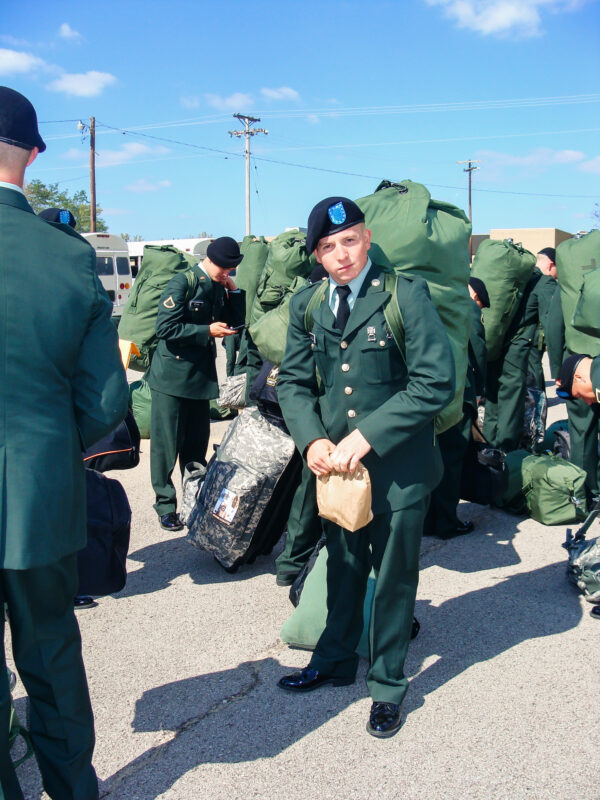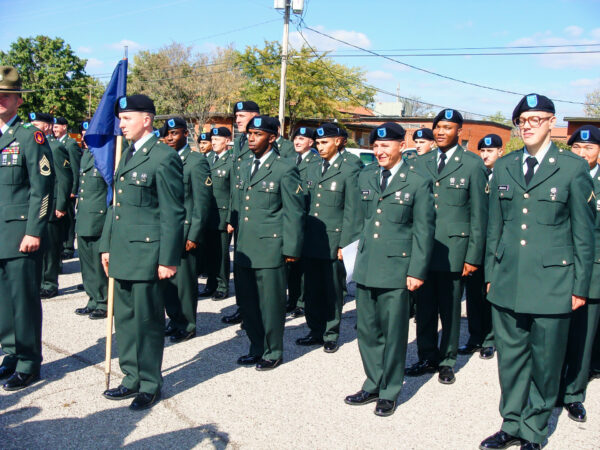BY
IRVINE, Calif.—Samuel Johnson was devastated. His mother had recently committed suicide. He was homeless, hooked on heroin, and supporting his habit by stealing. He spent his days wandering around Santa Monica, California, in a dazed search for meaning and drugs.
Johnson was 18 years old when he landed in Santa Monica, and found it a drug-lover’s paradise.
“I went out on the beach, and I saw all the homeless people in the parks and in Venice, and was like, ‘Wow, I could just walk and talk to somebody and get drugs pretty quickly,’ and so that’s what I did,” he told The Epoch Times.
Johnson paid another vagrant $50 to teach him how to use heroin with a needle. He’d been hooked on pills, but shooting up allowed for a quicker high.
That first needle sent Johnson down a two-decade path of destruction. Along that path were moments of clarity—a brief cleaning up after a forced detox in jail, after which he joined the Army. But much of it was despair.
He was kicked out of the Army, crashed his car, abused relationships, scammed loved ones for money, flouted rehab centers, and passed in and out of jail like cycling through a revolving door—all because of the drugs.
‘Really Fun Party Mom’
Johnson was 13 years old when his mother, Gabby, first moved her family to Orange County from Bremerton, Washington. A fair-skinned redhead, Gabby loved her three sons more than anything, Johnson said—but his mother was a closet alcoholic who liked her wine, and soon became abusive.
“She’d been doing really well in real estate and we got a really nice house in San Clemente,” Johnson recalled. But then she got in touch with old high school friends, got back into partying, and started using cocaine, he said.
As his mother’s addiction to cocaine and alcohol worsened, “the houses we moved into kept getting smaller and smaller,” Johnson remembered.
She was “this really fun party mom who would let all my friends from high school come over, and she’d buy us alcohol,” he said. They would play music, dance, and swim, and “she would hang out with us,” he said.
But the mornings after the parties weren’t as fun. He remembers how she randomly threw a shoe at his head one morning when he was getting ready for school. “She stopped being the fun-loving mother I knew, and kind of was just really anxious and depressed and sick all the time,” he said.
Scott, a high school friend, helped him escape the abuse at home. Johnson moved into Scott’s family’s home when he was 14.
Gabby slid further into a chasm. She went from living in a “big house, to a townhouse, to an apartment, to living in a car.”
Scott along with another friend helped keep Johnson stable throughout the rest of his high school years. “Scott entered my life at a party where I was super drunk and actually blacking out, when he said that he just saw a lot of potential in me and wanted to kind of mentor me and get me away from that crowd.”
When he turned 18, Johnson moved to Tucson, Arizona, to start a new life. The rent was cheaper there and he got an apartment with some friends. His grandmother encouraged him to start anew, and gave him a car to help.
“It got to the point where my grandma was saying like, ‘If your mom even calls you, don’t answer. She’s going to ask for money or she’s going to have to use your car. And she’s just too sick right now; we can’t even be talking to her.’”
A Request to God
Shortly after arriving in Tucson, on Halloween 2003, Johnson received a phone call from his youngest brother, Max, who was devastated. Max’s father—the boy’s legal guardian—was coming to take him away from Gabby.
Max didn’t want to go, Johnson said, but there was nothing he could do. So Johnson prayed to God. “I told Him, ‘If you can keep my brother in my life, to keep him here, I’ll know you’re real,’” he said.
“The night after Halloween, on November first, I got the call that my mother had hung herself,” Johnson said.
Max’s father decided “it would be just too hard for us to be separated at that time … so he left my brother with me.”
“So that obviously always stuck with me—because my prayer got answered, but then also, my mom died,” Johnson said.
Gabby’s suicide pushed Johnson over the edge. He became depressed, started drinking heavily, increased his drug use, and abandoned his little brother. “Instead of going in the direction you’d think I’d go after this, I went the complete opposite way,” he said.
His grandmother drove down from Eugene, Oregon, to pick him up and bring him to her house, to help him get his footing again.
In and Out of the Army
Johnson became “a terror” to his grandmother, he said. She soon sent him back to California with a plan to enlist in the Army and clean up his act. Instead, he became a homeless thief, stealing to support his growing addiction.
“Don’t ever send someone who’s a drug addict to Santa Monica because it’s just full of drugs,” he said.
He began shoplifting often and “created a little hustle out of it”—until he got caught. “After the third arrest for petty theft, they gave me three months in jail,” he said.
In his jail cell, Johnson had time to clear his head. As soon as he was released, he drove to Tucson and enlisted in the Army. He was worried they would discover he’d been in jail and reject him. “I was terrified until they said, ‘You know what, it’s fine.’”
“I wanted to be a medic, I wanted to help people,” he said. But being a medic, “that gives you access to drugs,” he said.
He graduated from basic training in 2008, became certified as a combat medic and Emergency Medical Technician (EMT), and became a platoon leader.
A young Samuel Johnson gathers with fellow soldiers during his Army days. (Courtesy of Samuel Johnson)
Samuel Johnson (L) holds the flag while standing in formation with fellow soldiers during his Army days. (Courtesy of Samuel Johnson)
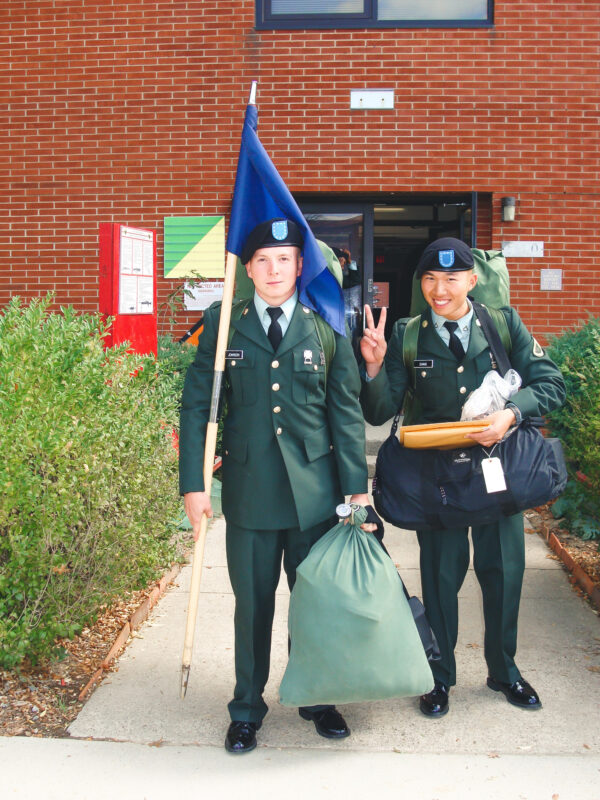
A young Samuel Johnson (L) carries the flag and a duffel bag outside an Army facility. (Courtesy of Samuel Johnson)
But three weeks before he was set to graduate combat medic school in San Antonio, Texas, he was tackled by another soldier during a training exercise and felt his knee snap.
“My ACL got torn, and they gave me Percocet,” he said. The pills triggered his addictive pattern after a few years clean, and he became hooked on painkillers.
“I was on a medical base … so I was able to go get my hands on [painkillers]. And I did graduate, but I graduated addicted,” he said.
Johnson was assigned to a medical support unit in Tucson, where his addiction to painkillers morphed into meth and heroin use. The Army discovered the drug abuse and tried to salvage his career, Johnson said.
The Army put him into rehab, but repeated attempts to right the ship failed, leading to an honorable discharge in 2011.
Soon after, he was arrested in Scottsdale, Arizona, for commercial burglary in a gas station, when he stole a pack of cigarettes from behind the employee counter.
“To go from the misery of jail, to the Army, and then back to jail was devastating,” Johnson said tearfully. “I can’t even think about it without crying.”
Trading his military uniform for an orange prison jumpsuit was “humiliating,” Johnson said. Once again, he had hit rock-bottom.
“I’m right back where I started,” he thought.
He started to reconnect with his faith in jail. “Jail didn’t like that,” he said. He had to be part of a gang to survive, and he was expected to hurt people. “They kind of forced me, they said like, ‘You’re going to have to beat this guy up or we’re going to kill you.’”
Homeless in OC
After seven months in prison, Johnson moved to Orange County, where he bounced his way toward the bottom. He met a woman and briefly moved in with her, but then he lost her car in a drug-fueled haze and the relationship ended.
He got a job replacing office ceiling tiles, but showed up to work high on drugs and botched the adjustments, causing thousands of dollars worth of damage. He was fired on the spot.
Over the next decade, Johnson was arrested over 30 times, mostly for petty theft, and was in and out of a dozen rehab programs.
The downward spiral of drugs and loss continued until 2018, when, with nowhere left to go, he moved to the large homeless encampment along the Santa Ana River. He spent his days and nights stealing and getting high.
As he returned to the riverbed to get high one evening, he thought about Jesus and decided to try praying.
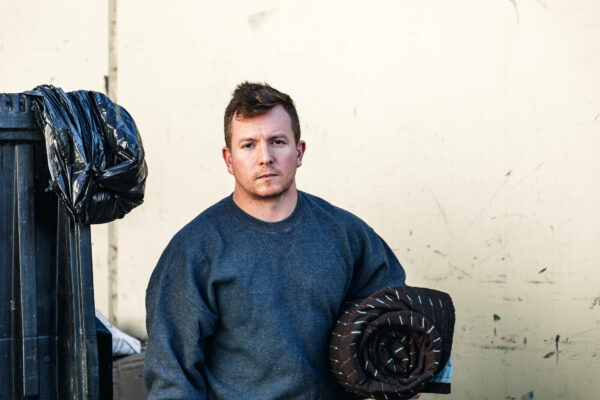
Formerly homeless veteran Samuel Johnson carries a bedroll in Tustin, Calif., on Nov 4, 2019. (Courtesy Orange County Rescue Mission)
“I was pretty high when I prayed,” he said. “But this window opened in front of my chest, and it showed my heart and it showed all these images of the things that I loved, and right at the top was meth, and then girls. And then God wasn’t in there.”
The vision made him want to change, Johnson said. He asked God for help—and was encouraged when a spirit voice answered, saying, “I will, it will take a few months.”
“I actually ended up wandering over to a church in the middle of the night, and I was super high,” he said. “There’s like a fountain or something, and I wanted to baptize myself in it. I was obviously kind of delusional, but I’ll never forget that.”
Johnson had accepted God into his life and felt changed—but the urge to get high remained. He began preaching to other homeless people in the riverbed while they partied together.
When a homeless friend asked him to steal a bicycle part from a nearby hardware store so he could fix his bike and get to work, Johnson struggled with the decision before trekking toward the store. But when he arrived, he couldn’t do it.
“There was something telling me to go the other way, the opposite way,” Johnson said. “So I did. I just kind of followed that, and the whole time I was saying, ‘Jesus Christ, thy will be done, and no matter what happens next is your will, because it’ll be what happens.’”
Before long, Johnson found himself standing in front of a church he attended regularly. At this church, even though he was homeless and addicted to drugs, they had always welcomed him.
A Path to Recovery
That day when he arrived there, “I was really tripping out … but all the people saw me, and they, like, rushed out.” They reached out to help him, and brought him inside the church.
Johnson felt the urge to be honest—so he told them about the bicycle part he was about to steal, and that he had meth and heroin in his backpack. He gave them the drugs.
“What do you want to do?” the minister asked.
“I want to serve Jesus Christ. That’s all I want. I don’t know how to do that,” Johnson responded.
The church members told Johnson about a program they knew at the Orange County Rescue Mission. They explained that the process to get admitted can be lengthy.
But Johnson was ready to change and willing to wait. First, he stayed in a hotel while he detoxed. After that, church members put him up in their homes.
“So, they assembled like a team of guys from the church, and they spent every moment with me for like a month,” Johnson said. “They were like sleeping in front of the door to make sure I didn’t do anything weird.”
On May 27, 2018, the wait was over: Johnson was admitted to the Orange County Rescue Mission.
‘The Least, the Last, and the Lost’
“We have a 100 percent success rate in people being sober in our programs. That’s a huge goal, recognizing the fact that many people have addiction issues,” the Orange County Rescue Mission’s Jim Palmer told The Epoch Times.
Palmer called the Mission “the anti-shelter shelter.” The organization’s motto is “to minister the love of Jesus Christ to the Least, the Last, and the Lost.”
“We call all our facilities ‘campuses.’ The homeless that we help, we call them ‘students.’ They progress through a program that starts with being a ‘freshman,’ and then a ‘sophomore,’ and then a ‘junior,’ and a ‘senior,’” Palmer said.
The Mission consists of 14 campuses where the students live, do volunteer work, gain stability through comprehensive support, and eventually graduate—almost always with a job set up and a new life in sight. There are currently 263 people in the program, which is free and supported by donations.
The Tustin-based Mission provided Johnson housing, resources, and training to help him transition back into society. Johnson said the Mission also restored something else he had lost: his honor.
“I lost any dignity or honor, and nobody cared that I was in the military,” said Johnson. “I would tell people when I’m homeless, ‘I’m a hungry veteran, help me out,’ you know, and I had a guy yell at me once for being such a bum.”
Sometimes the Mission invites the Tustin mayor and City Council members to publicly honor the veterans on campus, Johnson said. Recently, city officials presented the veterans with a new flag.
Johnson now works as a cook in the Mission cafeteria. He’s enrolled in Bible college and hopes to pursue a career in ministry when his time at the Mission comes to an end later this year. He’s also reconnected with his family, and speaks to his grandmother often.
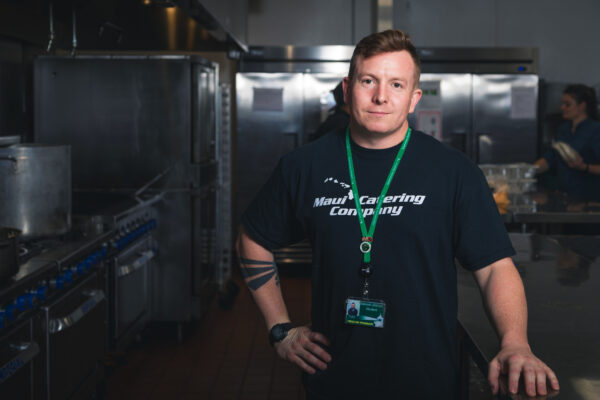
Samuel Johnson works as a cook in the cafeteria of the Orange County Rescue Mission in Tustin, Calif., on June 18, 2019. (Courtesy of Orange County Rescue Mission)
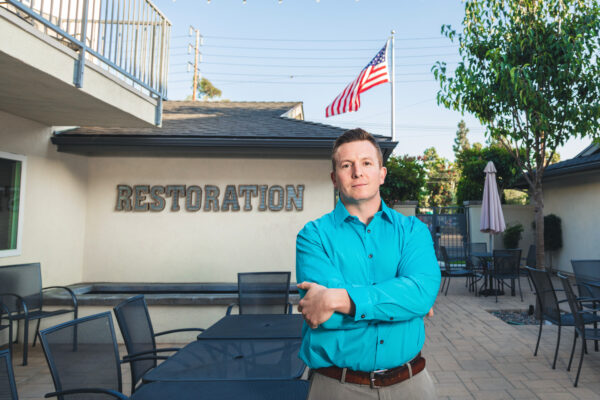
Samuel Johnson stands outside the Orange County Rescue Mission in Tustin, Calif., on Nov. 4, 2019. (Courtesy of Orange County Rescue Mission)
“Today I have more fun reading the Bible, playing worship music, and going to church than I ever did partying and doing drugs,” he said.
Johnson credits the Mission and two supervisors, Barbara Ratkovich and James Wright, for helping turn his life around. The supervisors are available around the clock, he said, and will drop whatever they are doing to assist someone in need.
“God can save you, no matter what you do or what you’re doing,” Johnson said.
“I look back now on my life as completely God’s plan for me. And I find so much peace and comfort in knowing that no matter what road I went down, it was leading to salvation in Him.
“And now He gave me this really powerful story to use for His glory, and the things that He did in my life that seemed really painful, actually all pointed to Him.”
Republished with Permission The Epoch Times SUBSCRIBE
Get Citizensjournal.us Headlines free SUBSCRIPTION. Keep us publishing – DONATE



